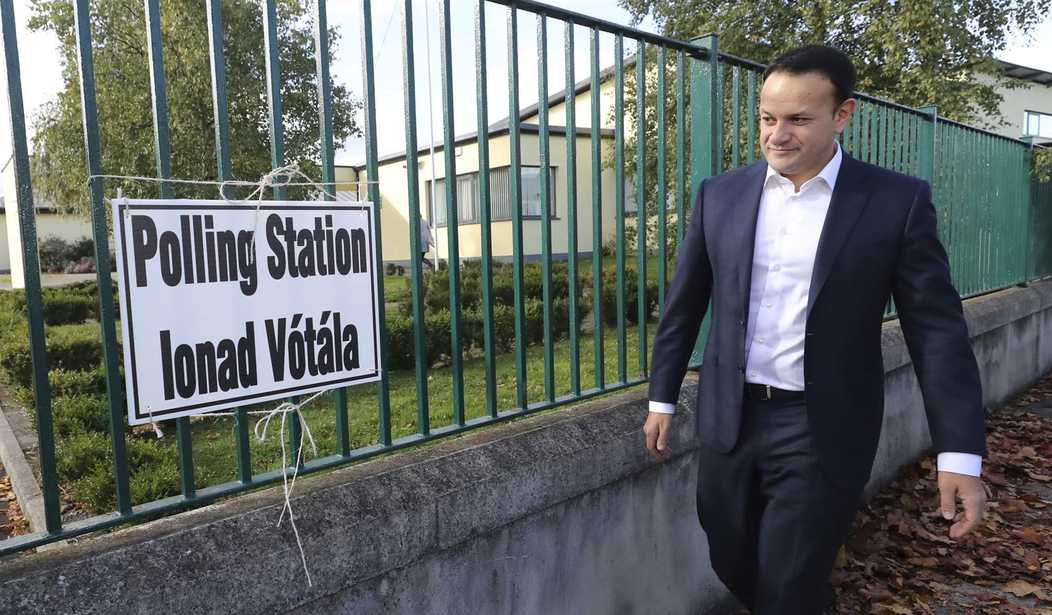In case you missed it, Friday was International Women's Day, when the world supposedly comes together in support of women's rights. In Ireland, Prime Minister Leo Varadkar had launched an attempt to "celebrate" the occasion by scheduling a vote on two amendments to his country's constitution that would ostensibly further the cause of equality for women by changing "very old-fashioned language" about a woman's role in the home and family life with more "modern interpretations." Varadkar apparently failed to read the room correctly, however. The proposed amendments failed at the ballot box by a wide margin, not even attracting the support of a majority of Irish women. (NY Post)
Irish Prime Minister Leo Varadkar has conceded defeat in the vote over two constitutional amendments that would have broadened the definition of family and removed language about a woman’s role at home. Vote tallies Saturday showed both referendums failing in a blow to his government.
Varadkar had pushed the vote to enshrine gender equality in the constitution and scheduled the vote on Friday, International Women’s Day.
Opponents argued that the wording of the changes was poorly thought out and some voters said they feared changes would lead to unintended consequences.
Varadkar, who pushed the vote to enshrine gender equality in the constitution by removing “very old-fashioned language” and trying to recognize the realities of modern family life, said it was clear the amendments were “defeated comprehensively on a respectable turnout.”
When modern Ireland was officially formed as a country with its own constitution in 1949, it was extremely conservative and overwhelmingly Roman Catholic, with more than 95% of the Irish practicing that faith. Both divorce and abortion were illegal at that time. In the years since then, Ireland has gradually evolved to a more socialist model, much like the rest of Europe. The percentage of the population that is Catholic fell to 69% by 2023. Divorce was legalized in 1995, same-sex marriage was approved in 2015, and the ban on abortions was repealed in 2018.
But even after all of those changes, the view of what constitutes a traditional family has clearly not eroded completely. The first change to the constitution that the Prime Minister proposed would have removed a reference to marriage as the basis “on which the family is founded." That would have been replaced with a statement saying that families can be founded on marriage or "on other durable relationships."
The second change was even more controversial to many voters. The current document declares that "A woman’s place in the home offers a common good that can not be provided by the state." It goes on to declare that a woman "should not be obligated to work out of economic necessity if it would neglect their duties at home." Most 21st-century Americans can probably imagine the volcanic eruptions that would take place in the streets if such language showed up in a legal document in the United States. But it's right there in the Irish constitution.
The Prime Minister proposed replacing that language with something far more generic. The amendment would have changed the declaration to say that the state would "strive to support the provision of care by members of a family to one another.” This reimagining of the fundamental definition of a family didn't go over very well at all. Yesterday, Varadkar was forced to concede that his proposals had been defeated "comprehensively on a respectable turnout.”
This result stands in contrast to other policies related to gender in Ireland. The country's constitution will retain strong language about the role of women, but they have legislatively wavered quite a bit on who does or doesn't qualify as a woman. They currently allow transgender "treatments" for anyone over the age of 18 who seeks them. The government also recently promised to enact a ban on conversion therapy designed to convince people to alter their sexuality or gender identity. So on the one hand, Friday's vote could be seen as a conservative revolt supporting the identity and role of women. But at the same time, it might encourage more men to engage in some gender-bending so that they can qualify for state payments allowing them to stay home and not hold down a job. As with much of the rest of the 21st century thus far, it's all very confusing.








Join the conversation as a VIP Member